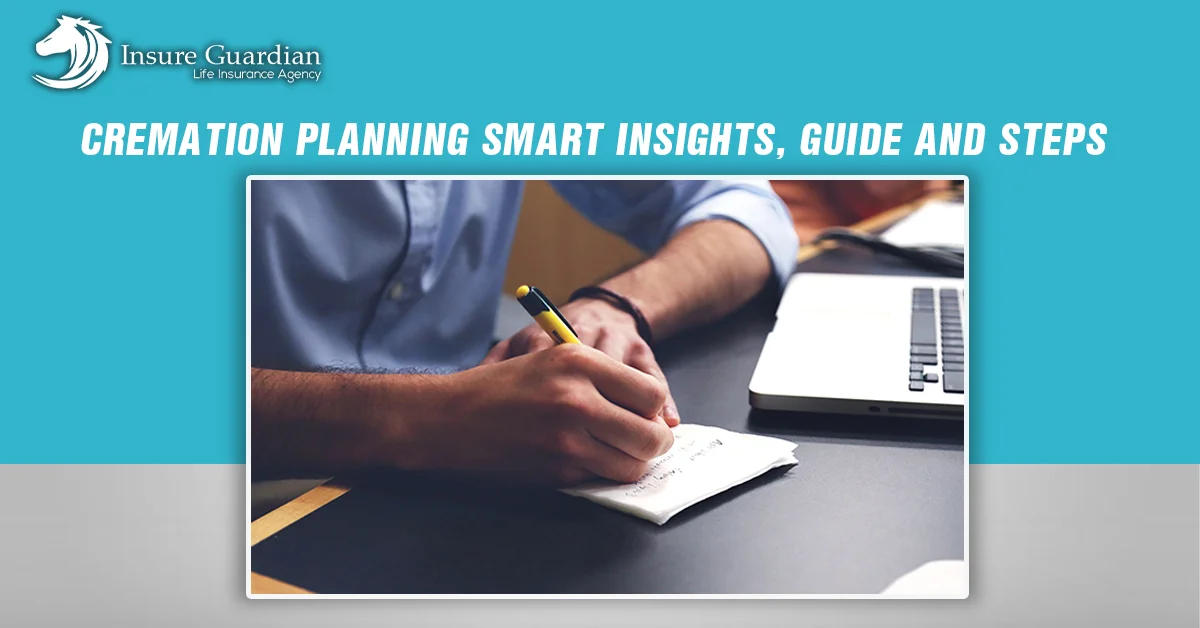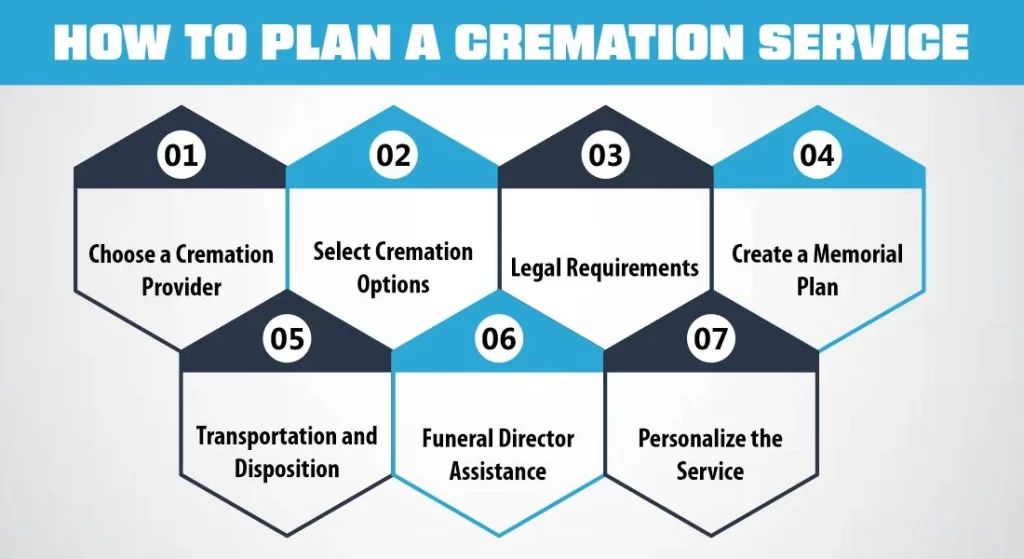Cremation planning is a practical guide to ensuring your final wishes are respected, without any unnecessary stress on your family. It’s like crafting the last chapter of your life story, ensuring it’s exactly the way you want it.
Even though planning is not the most exciting topic to think about, it’s a wise choice to plan for tomorrow, no matter how distant. Think of it as a practical roadmap to ensuring your end-of-life wishes are respected, without any unnecessary stress on your family.
In this blog post, we will go through the world of cremation, covering the types of cremation plans, the benefits, and the financial aspects. Read out the article to know more about it.
What is Cremation Planning?
Cremation planning is the thoughtful process of preparing for your end-of-life arrangements, specifically for cremation as the chosen method of disposition. It involves making important decisions and arrangements in advance, ensuring that your wishes are carried out when the time comes.
Cremation plan provides peace of mind, allowing individuals to make informed choices about their end-of-life arrangements, ultimately reducing the burden on their loved ones during a challenging time. It’s a responsible and considerate way to ensure that your wishes are respected when you’re no longer here to express them.
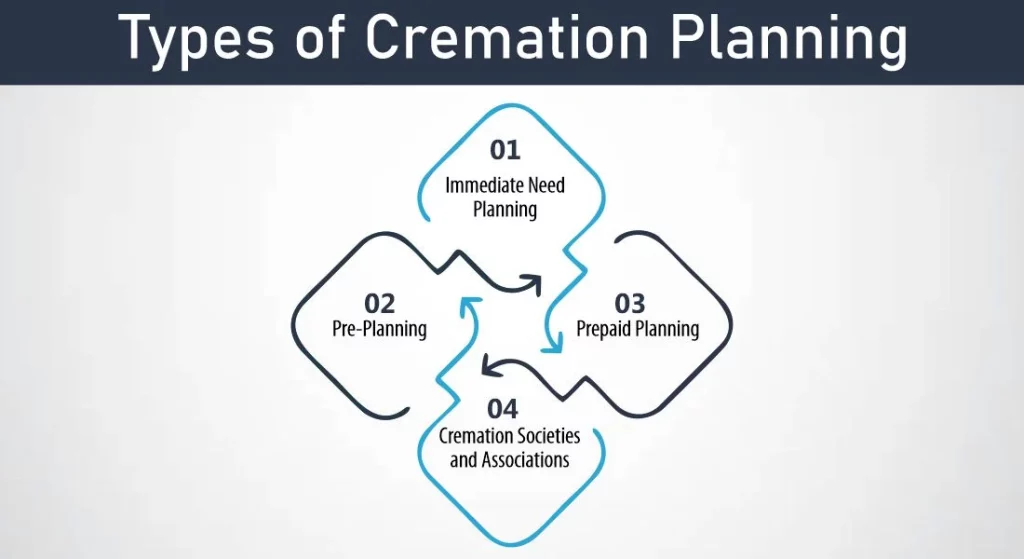
Types of Cremation Planning
Cremation plans come in various forms to accommodate different preferences and needs. Let’s explore the primary types of cremation planning:
1- Immediate Need Planning
This type of planning occurs when an individual passes away, and the family or responsible parties must quickly make arrangements for cremation. It often involves time-sensitive decisions, which can be emotionally challenging and stressful for the loved ones left behind.
2- Pre-Planning
Pre-planning, as the name suggests, involves making arrangements for cremation well in advance of the need. This allows individuals to define their preferences and document their wishes to ensure that they are honored. Pre-planning can be a proactive and considerate approach that eases the emotional and logistical burden on family members when the time comes.
3- Prepaid Planning
Pre-paid cremation planning involves not only specifying your preferences but also paying for the cremation services in advance. This locks in the cost at the current rate, protecting against potential future price increases. Such plans may be arranged directly with cremation providers or through specific insurance or trust options.
4- Cremation Societies and Associations
Some regions have cremation societies or associations that offer membership options for pre-planning cremation services. Memberships often include discounts, access to educational resources, and assistance with the planning process.
Each type of cremation plans has its advantages and considerations, and the choice depends on individual circumstances and preferences. Pre-planning, whether prepaid or not, is generally encouraged as it allows individuals to ensure their final wishes are carried out with precision while alleviating the burden on family members during a difficult time.
How to Plan a Cremation Service
Planning a cremation service involves several important steps to ensure that your end-of-life wishes are honored and the process is carried out smoothly. Here’s a step-by-step guide on how to plan a cremation service:
How Much Does Life Isurance Cost?
- Choose a Cremation Provider
Start by researching and selecting a reputable cremation provider or funeral home that offers cremation services. Consider factors like location, pricing, and customer reviews.
- Select Cremation Options
Decide on the type of cremation service you want. Common options include:
- Direct Cremation:
This is the simplest and most cost-effective option. It involves the cremation of the body shortly after death, without a formal viewing or funeral service.
- Traditional Cremation:
This includes a viewing or visitation, a formal funeral service, and then cremation. It resembles a traditional burial service but ends with cremation instead.
- Memorial Service After Cremation:
Cremation occurs first, followed by a memorial service where the urn containing the ashes may be present.
- Legal Requirements
Familiarize yourself with the legal requirements for cremation in your area. This includes obtaining the necessary permits and completing any required paperwork.
- Create a Memorial Plan
If you opt for a cremation with a memorial service, plan the details of the service. Consider the location, date, and time, and decide who will be involved in the service (e.g., clergy, family members, or friends).
- Transportation and Disposition
Determine how the remains will be transported to the crematory and back. You can also decide on the final disposition of the ashes, whether they will be scattered, placed in a columbarium, or kept in an urn.
- Funeral Director Assistance
Consider enlisting the help of a funeral director or cremation specialist. They can guide you through the process, help with paperwork, and ensure everything runs smoothly.
- Personalize the Service
Add personal touches to the service that celebrate the life of the departed. Share stories, photos, and mementos that hold special meaning.
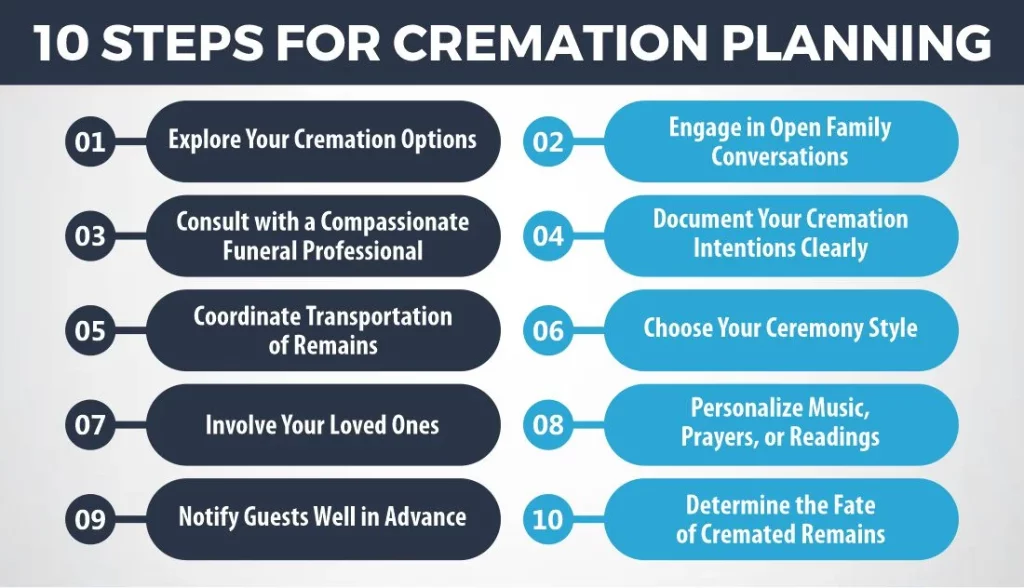
10 Steps for Cremation Planning
Planning for cremation involves several important steps to ensure that your wishes are respected and that the process goes smoothly. Here are the 10 steps for cremation plan:
1- Explore Your Cremation Options:
Discover the organized row of cremation planning options available on our website.
2- Engage in Open Family Conversations:
Initiate meaningful discussions with your family, understanding their opinions and preferences regarding cremation.
3- Consult with a Compassionate Funeral Professional:
Seek guidance from our experienced professionals for any questions or concerns you may have during this process.
4- Document Your Cremation Intentions Clearly:
Easily navigate the documentation process with the assistance of provided forms. Contact us for more information.
5- Coordinate Transportation of Remains:
Trust us to handle the transportation of physical remains, either to our facility or directly to the crematory.
6- Choose Your Ceremony Style:
Tailor your ceremony to your liking, whether choosing a traditional funeral followed by cremation or planning a delayed memorial service, celebration of life, or scattering ceremony.
7- Involve Your Loved Ones:
Encourage your family and friends to participate in the decision-making process, securing sure of matching up in a straight line with their feelings and preferences.
8- Personalize Music, Prayers, or Readings:
Add a personal touch to your event by selecting music, prayers, or readings that stir up interest in you and your guests.
9- Notify Guests Well in Advance:
Considerate planning involves informing guests ahead of time, especially if they need to make travel arrangements or request time off from work.
10- Determine the Fate of Cremated Remains:
Decide on the disposition of cremated remains, whether through the visual focal point of an urn, scattering during the event, or other personalized options like keepsake urns for family members.
Cremation Planning vs. Pre-Planning
Planning for Cremation and pre-planning are two approaches to make end-of-life arrangements, but they differ in terms of timing and the level of preparation involved. Let’s explore the distinctions between cremation planning and pre-planning:
Cremation Planning
Timing: Cremation plans is a broader term that encompasses the entire process of planning for cremation, including both immediate need planning and pre-planning.
Immediate Need Planning: This aspect planning of cremation involves making arrangements for cremation after a person has passed away. It often entails quick decision-making and is generally more stressful for the family.
Pre-Planning: Pre-planning, on the other hand, is a proactive approach where individuals make arrangements for their cremation well in advance of the actual need, while they are still alive.
Benefits of Cremation Planning:
Immediate need planning is often rushed and emotionally challenging for the family, as decisions must be made quickly.
Pre-planning allows individuals to make informed choices about their end-of-life arrangements, ensuring their preferences are honored, and it reduces the emotional burden on family members when the time comes.
Timing: Pre-planning specifically refers to making arrangements for your cremation services ahead of time, well before the need arises.
Benefits of Pre-Planning:
Full Control: Pre-planning gives individuals full control over their cremation arrangements, allowing them to specify their preferences precisely.
Reduced Stress: It eases the emotional burden on family members, as they don’t have to make difficult decisions during a time of grief.
Personalization: Pre-planning allows individuals to personalize their end-of-life services, ensuring that their values and wishes are respected.
Cost-Effective: It can be more cost-effective, as the cost is locked in at the time of planning, protecting against future price increases.
In summary, cremation plans is a broader term that encompasses both immediate need planning and pre-planning. Pre-planning is a proactive approach that involves making detailed arrangements for cremation services well in advance, providing numerous advantages, including emotional relief for family members and the ability to personalize one’s end-of-life services.
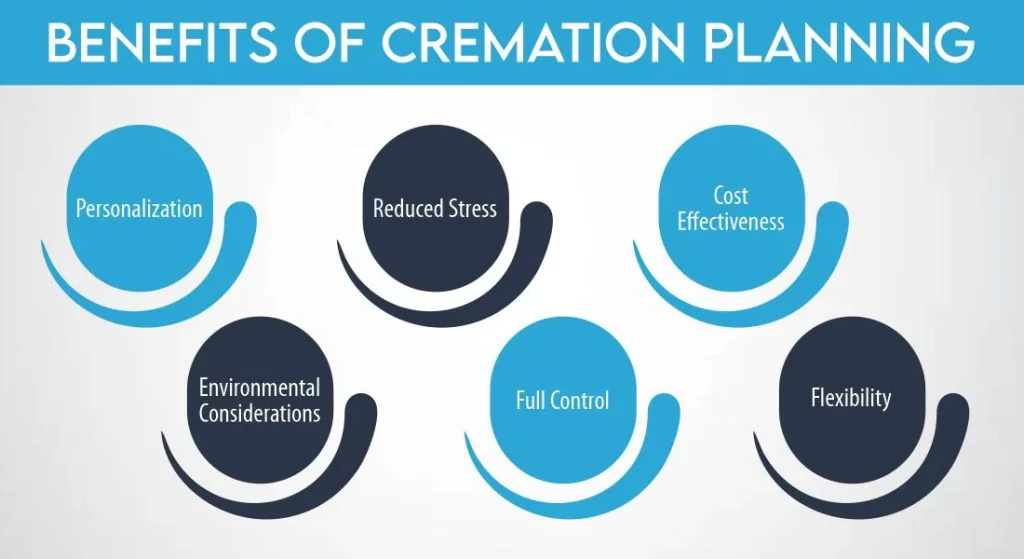
Benefits of Cremation Planning
Planning for Cremation offers several notable benefits, both for individuals making the arrangements and for their loved ones. Here are the key advantages of cremation planning:
Personalization
Cremation plans allow you to personalize your end-of-life arrangements to reflect your unique life, values, and preferences. You can choose the type of service, location, and the specific details that are meaningful to you.
Reduced Stress
By planning in advance, you alleviate the emotional burden on your family and loved ones. They won’t have to make difficult decisions during a time of grief, which can be a source of great relief.
Cost-Effectiveness
Cremation is often more cost-effective than traditional burial. When you plan ahead, you can make informed decisions about the cost, select a provider that fits your budget, and potentially take advantage of prepayment options to lock in today’s prices.
Environmental Considerations
Cremation is considered an eco-friendly choice, as it does not require land for burial and eliminates the need for embalming chemicals. This can be a key consideration for individuals who value environmental responsibility.
Full Control
Cremation plan gives you full control over your end-of-life arrangements. You can ensure that your final wishes are carried out precisely, avoiding any uncertainty or disputes among family members.
Flexibility
Cremation offers a range of options for the disposition of ashes, including scattering, placement in a columbarium, or keeping them at home. Pre-planning allows you to specify your preferred method of disposition.
Best Time to Pre-Plan Your Cremation
The best time to pre-plan your cremation is when you are in good health and of sound mind, well before the need arises. Here are some considerations for determining the ideal time for pre-planning:
When You’re in Good Health
Pre-planning should ideally occur when you are in good physical and mental health. This ensures that you can make decisions thoughtfully and without the urgency of a health crisis.
While You’re Alive and Well
Pre-planning is most effective when you can actively engage in the process and clearly express your preferences. Planning when you are well allows you to articulate your wishes precisely.
When You Want to Ensure Your Wishes Are Honored
If you have specific preferences for your end-of-life arrangements, pre-planning is the best way to ensure that your wishes are respected. Waiting until a later time may result in your preferences not being known or followed.
To Ease the Burden on Loved Ones
Pre-planning reduces the emotional and logistical burden on your family and loved ones. By making decisions ahead of time, you spare them the stress of having to make these choices during a time of grief.
To Lock in Costs
Pre-planning allows you to lock in the costs of your cremation at the current rates. This can be particularly advantageous, as it protects you against potential future price increases.
Conclusion
Planning for Cremation is a thoughtful and practical way to ensure your end-of-life wishes ,while providing peace of mind to your family. By understanding the types of cremation, following the steps, and considering the benefits, you can make an informed decision and lighten the emotional burden on your loved ones. Start from today, and take the necessary steps to create a personalized and cost-effective end-of-life arrangement.

Expert Life Insurance Agent and health insurance agent
Dylan is your go-to guy for life and health insurance at InsureGuardian. He’s helped over 2,500 clients just like you figure out the best insurance plans for their needs. Before joining us, Dylan was sharing his expertise on TV with Global News and making a difference with various charities focused on health. He’s not just about selling insurance; he’s passionate about making sure you’re covered for whatever life throws your way.





